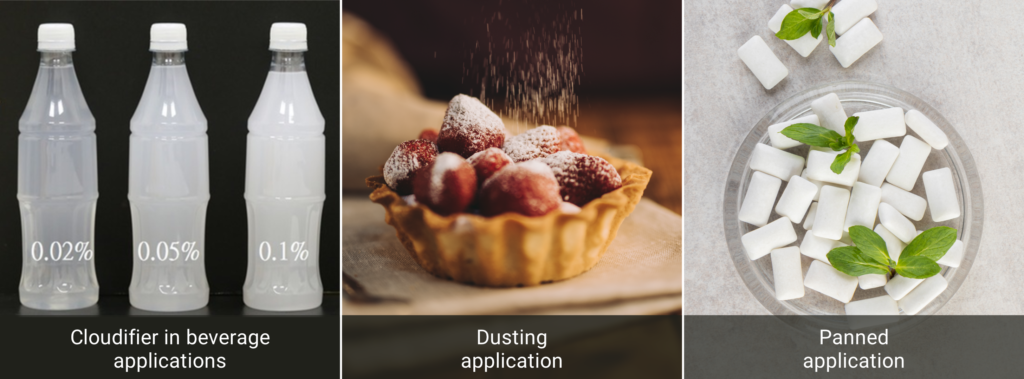White is synonymous with feelings of purity, peace, and simplicity, but it’s not the first hue that comes to mind when it comes to white food colouring. Some of us may even be surprised that food colour is used for all food products, as brighter shades attract customers and foodies much more. Nevertheless, white food dyes are extensively used in candies, coffee creamers, baked products, white sauces, and many more.
Typically, white food colouring is a combination of water, sugar, and titanium dioxide. Thanks to its high refractive index, titanium dioxide is primarily responsible for the brilliant white colour. Light effectively bounces off it, making our eyes perceive a vivid bright white. This specific property of titanium oxide results in its widespread use in sunscreen. Also, the consumption of moderate levels of titanium dioxide is considered safe and not responsible for any adverse health effects.
Why the need for a natural white?
One of the primary drivers of the search for a natural alternative to titanium oxide is that the European Commission has decided to ban it as a food additive in the EU. From February 7, 2022, until August 7, 2022, there was a six-month phase-out period, followed by a complete ban. After Commission Regulation (EU) 2022/63 is published in the EU’s Official Journal on January 18, 2022; Annex II and III to Regulation (EC) No. 1333/2008 will be changed to reflect this.
The ruling also adds that the need to keep titanium dioxide (E171) on the EU list of food additives – for use as a colouring in medicines – will also be reviewed. Moreover, on November 30 2021, Commission Implementing Regulation (EU) 2021/2090 was published in the official journal, which said that titanium dioxide could not be used as a feed additive for any animal species.
These ongoing and proposed restrictions collectively cover almost the entire gamut of titanium oxide applications as a food additive.
The Skittles Story
One of the high-profile news stories that compounded the negative perception of Titanium dioxide involves the famous confectionery manufacturer Skittles. Jenile Thames, a California citizen, sued 'Mars' - the brand's parent company in a class action complaint, alleging that the product is harmful due to high levels of titanium dioxide. The compound is a component in US-made Skittles, although numerous European nations have prohibited its use.The EU's restriction on titanium dioxide supports the claims that the candy is hazardous and a health risk for its less aware customers. According to the lawsuit, titanium dioxide can infiltrate cells and circulate via biological membranes – even though its use in food isn't illegal. Mars' continued usage of US-sold Skittles contradicts its 6-year-old pledge to phase out artificial food colours. The company told the Center for Food Safety in 2016 that it would remove titanium dioxide by 2021; however, it is yet to keep this promise. In addition, the California lawsuit mentioned above wanted the company to take full responsibility for the ingredients in its widely popular rainbow candy.
Does a natural white exist?
Fortunately, a pure white colour can be derived using natural ingredients. Common examples of naturally sourced white food colouring are derived from,
- Calcium Carbonate
- Modified Starch
- Rice Starch
The most pressing concern is how efficient these natural choices are. No one product is perfect for every scenario. Whether or not a colour works well in a certain situation is context-specific. That’s why it’s important to create many variations of white for different use cases. In addition, titanium oxide’s highly effective results make it extremely difficult to replace in this context.
You can find other effective options on the market, such as:

Despite the challenge replacing titanium dioxide presents, you can leverage Symega’s natural and customized offerings to achieve the same bright white hue for foods and drinks. With its cutting-edge technology and extensive R&D, Symega can help you find the perfect natural white formulation, depending on your product type.
Symega will assist you in overcoming the regulatory barriers that are restricting the use of titanium oxide; so you can give your valued customers a safer, healthier product, without compromising on visual appeal.
Join the Natural Shift.

 The EU's restriction on titanium dioxide supports the claims that the candy is hazardous and a health risk for its less aware customers. According to the lawsuit, titanium dioxide can infiltrate cells and circulate via biological membranes – even though its use in food isn't illegal.
Mars' continued usage of US-sold Skittles contradicts its 6-year-old pledge to phase out artificial food colours. The company told the Center for Food Safety in 2016 that it would remove titanium dioxide by 2021; however, it is yet to keep this promise. In addition, the California lawsuit mentioned above wanted the company to take full responsibility for the ingredients in its widely popular rainbow candy.
The EU's restriction on titanium dioxide supports the claims that the candy is hazardous and a health risk for its less aware customers. According to the lawsuit, titanium dioxide can infiltrate cells and circulate via biological membranes – even though its use in food isn't illegal.
Mars' continued usage of US-sold Skittles contradicts its 6-year-old pledge to phase out artificial food colours. The company told the Center for Food Safety in 2016 that it would remove titanium dioxide by 2021; however, it is yet to keep this promise. In addition, the California lawsuit mentioned above wanted the company to take full responsibility for the ingredients in its widely popular rainbow candy.


